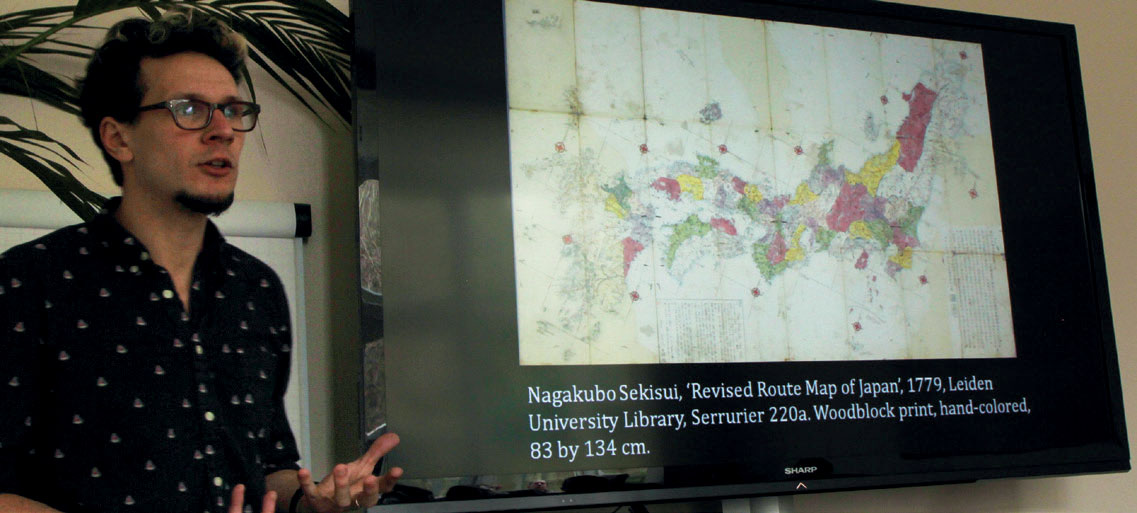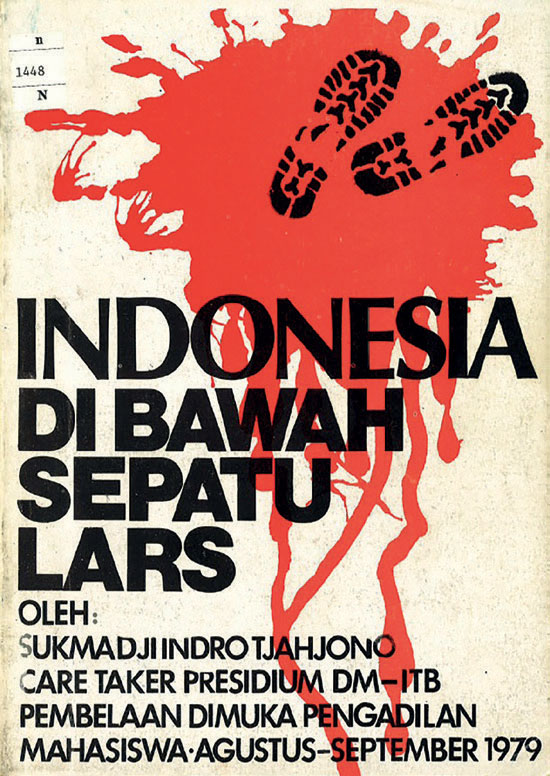Leiden University's new Asian Library
After three years of planning and construction, Leiden University's new Asian Library is ready. Bringing together various important collections on Asia, the Asian Library holds the largest collection on Indonesia worldwide, and some of the foremost collections on South and Southeast Asia, China, Japan and Korea. The Executive Board of Leiden University warmly welcomes all to attend the official and festive Grand Opening on 14 September 2017.
To mark the achievement, Leiden University is celebrating the whole of 2017 as the ‘Leiden Asia Year’. Working together with other Asia-oriented institutes in Leiden as well as with the Leiden municipality, so far the agenda of the Leiden Asia Year has already featured over 70 events, with a further 40 still scheduled to take place, including the library’s Grand Opening. Students and scholars will not have to wait until September, as the Asian Library was opened for the public on March 31.
The Asian Library
In 2014, Leiden University decided to build a new Asian Library to bring together under one roof all of the collections of the various Leiden University libraries on China, Japan, Korea, India and Indonesia. Also included are the Heritage Collection of the Royal Tropical Institute (KIT) in Amsterdam and the library of the Leiden-based Royal Netherlands Institute for Southeast Asian and Caribbean Studies (KITLV). Adding up to over 30km in length, the collections of the Asian Library belong to the most important worldwide, both in quantity and quality.
The new Asian Library was realised by adding a complete extra floor on top of the Leiden University's main library building. This extension offers direct access to a large volume of reference works, as well as work spaces for students and researchers, a group study room, a seminar room and a small cinema. The library also houses numerous Asian special collections, which are available in the nearby Reading Room Special Collections. Whatever is not immediately on-hand, can be ordered and presented within an hour.
Asian special collections
The Asian Library comprises many special collections, including a huge variety of rare books, thousands of manuscripts, maps, prints, drawings and photographs, and hundreds of archives. Predominant is the written heritage originating from or dealing with Southeast Asia (especially Indonesia), South Asia and Tibet, and East Asia. The collections contain an abundance of native materials, such as palm leaf manuscripts and block prints, documenting the many religions, languages and cultures of Asia in word and image over a period of more than four centuries. It also holds ship logs, letters, research reports, publications, photographs and other source materials collected from and testifying to the presence of European travellers, merchants, scholars, colonial civil servants and institutions in Asia.
These unique Asia collections of the Asian Library, but also those of the nearby Hortus botanicus Leiden, the Japan Museum SieboldHuis and the Museum of Ethnology, are among the many reasons for scholars around the world to come to Leiden, along with the abundance of scholarly expertise present at Leiden University and other Asia-oriented Leiden institutions.
IIAS donates books to the Asian Library
During a small ceremony on 31 March, Leiden University Rector Magnificus Prof. Carel Stolker officially declared the new Asian Library open to the public. This was also the moment for the International Institute for Asian Studies (IIAS) to symbolically gift the library the first of the more than 500 books submitted for the 2017 'ICAS Book Prize' (IBP).
IIAS maintains excellent relations with the Asian Library. Not only do our fellows use its collections in their research (some examples of which are included below), the Asian Library is also the main sponsor of the ICAS Book Prize, which is awarded every two years (when Asia scholars from around the world gather during the International Convention of Asia Scholars) for outstanding books and dissertations on topics related to Asia in the Humanities and Social Sciences. In return, the Asian Library receives one copy of each book submitted to the IBP. In March 2017, more than 500 books were donated, including titles in English, Chinese, Korean, German and French. This number is likely to rise to perhaps as high as 1000 in 2019, with a more active participation of the foreign-language submissions and the expansion of the reading committees to include Japanese submissions as well.
In 2019, the 11th ICAS convention is planned to take place in Leiden. It will be the first ICAS in Europe since the first two editions in Leiden and Berlin, in 1998 and 2001 respectively. As usual ICAS will cover a wide range of topics, but will also focus on ‘Asia in Europe’, demonstrating how this region of the world is itself deeply influenced and shaped by its historical connection with Asia and Asian societies. Contributing to the Leiden Asia Year, IIAS will organise an afternoon meeting on 10 October to introduce the academic community of Leiden to ICAS.
Join us for the Grand Opening and ‘Tour of Asia’ festival on 14 September
The Executive Board of Leiden University invites you to the Grand Opening of the Asian Library. If you would like to join the celebrations, please register now at www.universiteitleiden.nl/grand-opening-asian-library.
The Grand Opening Day will start at 10am in the Pieterskerk (Peter’s Church), with a keynote speech by renowned global historian Peter Frankopan, musical performances, a presentation of the Asian Library and its rich collections, and the launch of the book Voyage of Discovery. Exploring the Collections of the Asian Library. After a walking lunch, the programme is resumed in the afternoon with an informative and fascinating 'Tour of Asia' in and around Leiden University's central locations. Various parallel events will be held at different locations, including the IIAS office, and will involve lectures, country updates, exhibitions, tours, contemporary Asian films, music, workshops, panel discussions and much more. At the end of the day, all attendees are invited for snacks and drinks in the University Library. Detailed information about the programme will be made available on the Leiden Asia Year website: www.leidenasiayear.nl
Leiden Asia Week (13-17 September)
The following events are scheduled in the week of the Grand Opening. Information about these and all other events of the Leiden Asia Year are available at: www.leidenasiayear.nl
13 Sept.: De-bordering Asia - Graduate conference
14 Sept.: Grand Opening of the Asian Library and ‘Tour of Asia’ festival
14-17 Sept.: Middle Period Chinese Humanities – International conference
15-16 Sept.: Mapping Asia: Cartographic Encounters between East & West – International conference
16 Sept.: Night of Arts and Sciences – Cultural festival with acts and performances
Asian Studies in Leiden
Leiden owes much of its Asian collections to 400 years of Dutch interactions with Asia, starting with the endeavours of the Dutch East India Company (VOC) from 1602. Shortly after 1600 the university library acquired the first written materials from Asia. But the true foundation of the extensive Asia collections at Leiden University was laid in the second half of the nineteenth century, when substantial collections found their way to the library. Among these were the colonial library of the Royal Academy in Delft (1864), the books of the physician and scholar of Japan studies Philipp Franz von Siebold (1881), and the bequest of the linguist and Indologist Herman Neubronner van der Tuuk (1895-1897).
The growth of the Asian collections kept pace with the increasing study of Asian languages and cultures in Leiden. The German scholar Johann Joseph Hoffmann was appointed professor of Chinese and Japanese in 1855. Hendrik Kern became professor of Sanskrit in 1865. In 1864, the academic component of the Koninklijk Instituut voor Taal-, Land- en Volkenkunde (KITLV), the State institute for the education of East Indian (Indonesian) civil servants, was moved from Delft to Leiden. In 1966 the Institute, including its library, was also relocated to Leiden. With such a concentration on Asia in Leiden, it was only logical to house the International Institute for Asian Studies (IIAS) in Leiden as well, when it was established in 1993 by the Ministry of Education as the leading Dutch institute to promote the highest quality of research and knowledge on Asia by actively stimulating national and international cooperation.
Today, Leiden University runs world class research and unique teaching programmes in the field of Asian area studies (organised as of 2009 in the School of Asian Studies, which is part of the Leiden University Institute for Area Studies). Leiden University is the only university in the Netherlands that offers BA and MA programmes in Chinese, Japanese, Korean and South and Southeast Asian Studies. While language is a large part of these teaching programmes, they also offer students a wider variety of disciplinary and thematic topical perspectives (e.g., history, philosophy, society, religion, politics). A multidisciplinary approach is even more present in research, exemplified, among others, by the appointment at LIAS of researchers from other disciplines. Moreover, experts from Leiden in the Humanities, Social Sciences and Law often join forces in their research on Asia and many vibrant links exist between the different Asia-oriented institutes based in Leiden.
Asian collections in research
THE AGENDA OF THE LEIDEN ASIA YEAR features an abundance of different types of activities and topics pertaining to Asia. Below are three examples of activities that illustrate how the collections of the Asian Library are used in research and education.
Sanskrit as a vehicle of cultural exchange
Leiden University holds one of the oldest and richest Sanskrit collections. From 18 May to 5 September, the exhibition Sanskrit – Across Asia and Beyond explores Sanskrit as a vehicle of transculturation and exchange. It incorporates a broad range of materials from the Asian Library, including rare manuscripts, vibrant photographs of Asian temples and icons, and original videos and multimedia presentations. The exhibition is organised in cooperation with IIAS fellow Dr Elizabeth Cecil (see Cecil’s article in this issue), who is a historian of pre-colonial South and Southeast Asia with a focus on Religion and Material Culture. At IIAS, Cecil is completing a book manuscript, entitled Mapping the Pāśupata Landscape: Polity, Place, and the Śaiva Imaginary in Early Medieval North India with a fellowship provided by the J. Gonda Fund.
Mapping Asia
The Asian Library holds close to 30,000 maps concerning Asia, including several large collections of historical maps. Among these are the maps of Japan collected by Philipp Franz von Siebold (1796-1866) during his stay in Japan where he was employed by the Netherlands Government at the trading post of Deshima in the bay of Nagasaki. These maps were the reason for Dr Radu Leca (fellow at IIAS) to come to Leiden, where he is surveying both Western maps of Japan and Japanese maps in Dutch collections for his research on cartographic sources as testimonies of the geopolitical thought in early modern Japan. In addition, Leca has been working closely together with the Asian Library as a map curator for the permanent exhibition of Japanese maps in the Japan Museum SieboldHuis. Leca is also one of the thirty scholars to present a paper during the international conference Mapping Asia – Cartographic Encounters between East & West, on 15-16 September. Mapping Asia is also the title of an exhibition organised by the Asian Library at the Museum of Ethnology from 14 September 2017 until 16 January 2018. This exhibition not only features historical maps, prints and books, but also highlights various aspects of Asia using cartography and (GIS) mapping tools (see Leca’s article on page 6 of this issue).
Symposium ‘Collecting Asia’
Another activity of the Leiden Asia Year to mention here is the symposium Collecting Asia, which took place in the Museum of Antiquities on 17 March 2017. Organised by the Centre for Global Heritage and Development, the National Museum of Antiquities and Japan Museum SieboldHuis, in cooperation with the Asian Library, the symposium not only provided an overview of the existing collections from Asia in Leiden, but also addressed the history, systematics and ethics of collecting. One of the speakers was Leiden PhD student Taufiq Hanafi, who is currently doing research at KITLV. For his work on fiction as counter-history in Indonesia, he uses works that are present in the Asian Library but which are banned (and burned) in Indonesia. Hanafi: “Collecting Asia, despite its bias-cum political connotation that includes structure, control and curiosity towards the foreign, can be very helpful as it directly helps in preserving material culture or, in this case, books that are no longer accessible in their home country due to tight censorship, banning, or practical reasons such as shelf-life”.
Sources and further reading
Asian Library: www.asianlibraryleiden.nl
Special Collections (pictures and information): www.iias.nl/asian-library
Leiden University Asia Dossier: www.onderzoeksgebieden.leidenuniv.nl/en/asia
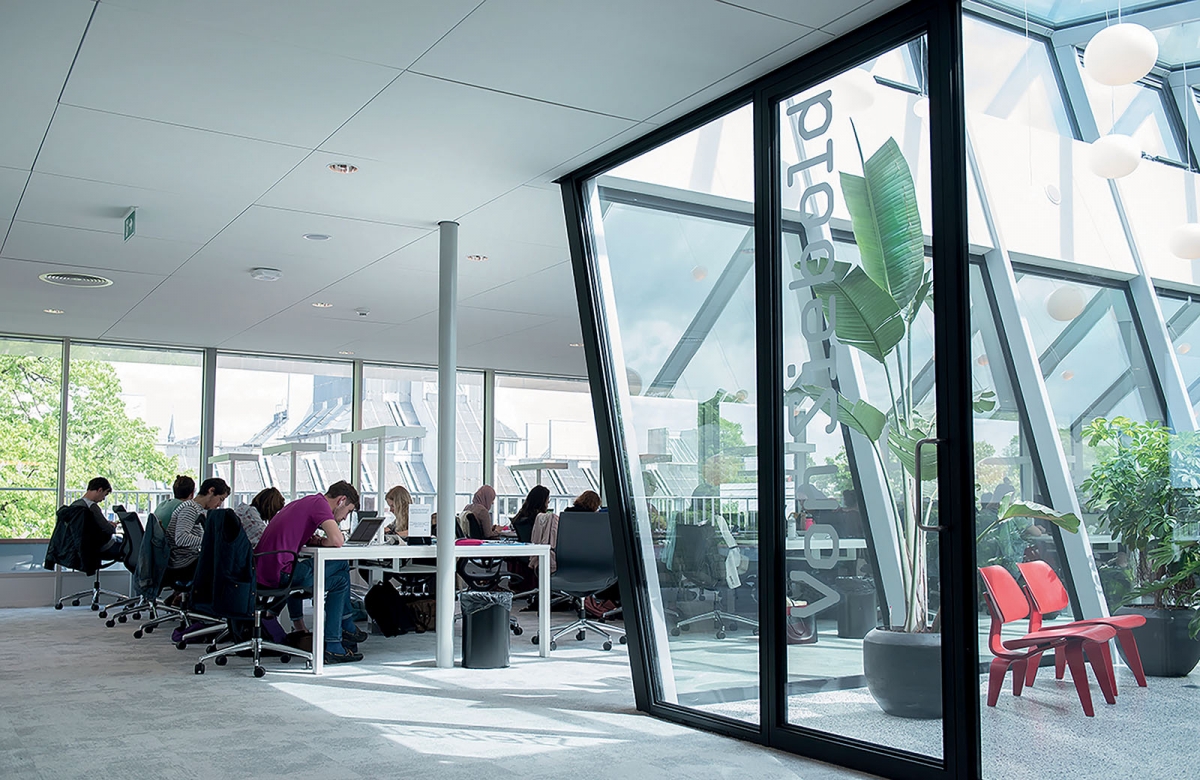
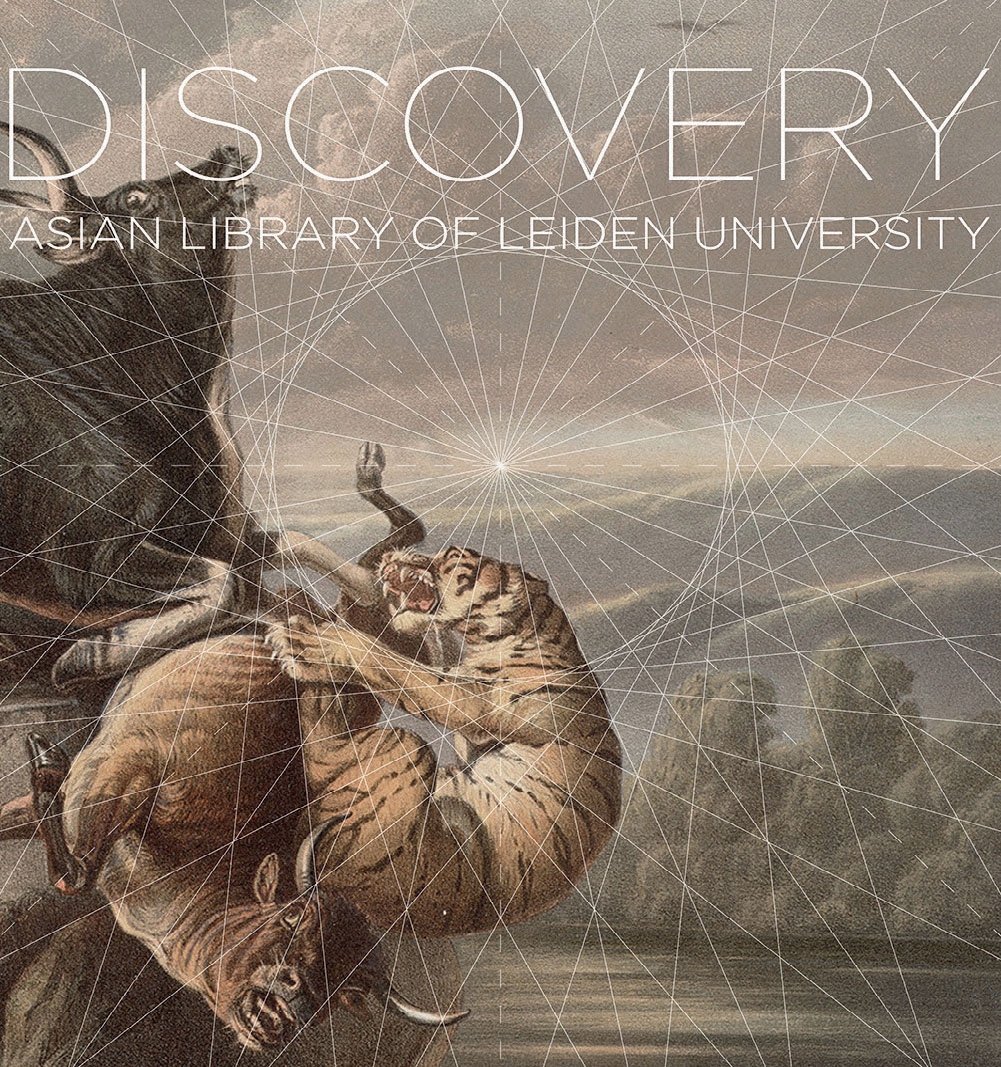
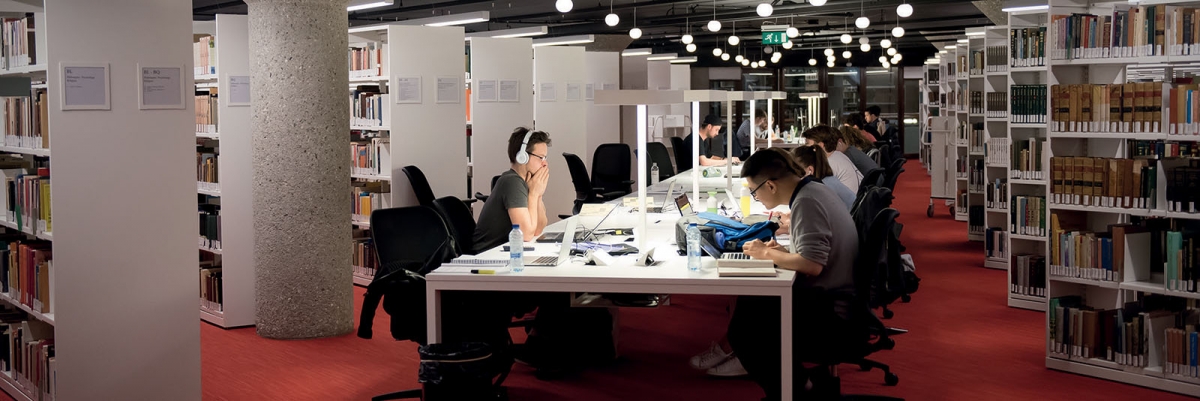
![Charter of the Cōḻa kings Rājarāja [985-1012] and Rājendra I [1012-1042], 21 copper plates held by a ring with Cōḻa seal, Sanskrit (in Grantha script) and Tamil. Charter of the Cōḻa kings Rājarāja [985-1012] and Rājendra I [1012-1042], 21 copper plates held by a ring with Cōḻa seal, Sanskrit (in Grantha script) and Tamil.](/sites/default/files/44-45_IIAS_77d_Page_1_Image_0006.jpg)
